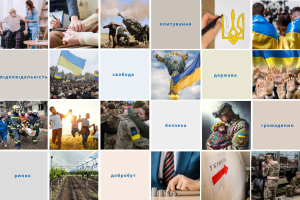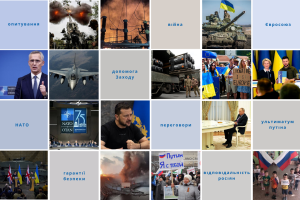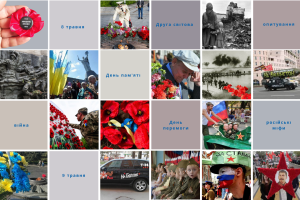The opinion poll was conducted by Ilko Kucheriv Democratic Initiatives Foundation in collaboration with Center for Political Sociology during February 1–12, 2022. In general, 2001 respondent were surveyed on the sample representing the adult population of Ukraine (excluding the temporarily occupied territories). The sample is representative of such indicators as gender, age, type of settlement, and oblast of residence. The maximum theoretical sampling error does not exceed 2.2%.
Composition of macroregions:
- The West — Volyn, Zakarpattia, Ivano-Frankivsk, Lviv, Rivne, Ternopil, Chernivtsi oblasts;
- The Center — Vinnytsia, Zhytomyr, Kyiv, Kirovohrad, Poltava, Sumy, Khmelnytsky, Cherkasy, Chernihiv oblasts and the city of Kyiv;
- The South — Zaporizhzhia, Mykolaiv, Kherson, Odesa oblasts;
- The East — Dnipropetrovsk, Kharkiv oblasts;
- The Donbas — parts of Donetsk and Luhansk oblasts controlled by Ukraine.
As of the first decade of February 39%, of the Ukrainian population believed that the threat of full-scale aggression by Russia was either very likely or inevitable. Another 33% of respondents believe that a threat from Russia, although not great, is possible. Only 7% of Ukrainians believe that there is no threat from the eastern neighbor at all.
In all macroregions of Ukraine except for Donbas, the majority of the population is inclined to believe that there is now a serious threat of full-scale aggression by the Russian Federation. This thesis is most supported by the population in the west of Ukraine (49%). Most of those who consider such a threat insignificant are among residents of the controlled parts of the Donbas (64%). Most of those who do not believe at all in the threat of aggression by Russia live in the East (15%).
Among the voters of the four parliamentary parties, it is the electorate of "European Solidarity" that sees a serious threat of full-scale aggression initiated by the Russian Federation most (65%). The opposite opinion is held by the voters of the "Opposition Platform — For Life (OPZZh)": in the first decade of February, one third of them believed that there was no threat of aggression from Russia at all.
The absolute majority of Ukrainians (61%) blame the Russian leadership for the growing threat of war. This view is shared by the majority of the population in the West (84%), South (59%), East (41%) and central part of Ukraine (60%). A quarter of Ukrainian citizens believe that the blame lies with Ukraine's leadership. This opinion dominates only in the Ukrainian-controlled parts of Luhansk and Donetsk oblasts (53%).
In contrast to the Russian narrative of protecting Russian speakers, 44 percent of Russian-speaking Ukrainians believe that Russia is primarily responsible for the current tensions.
The voters of "Batkivshchyna" (68%), "European Solidarity" (84%) and "Servant of the People" (72%) political parties agree that it is the Russian authorities who are responsible for the growing threat of full-scale military operations. At the same time, the main antagonists for the voters of OPZZh political party are the leadership of Ukraine (49%) and the United States (42%).
In the case of an escalation of the military conflict, 43% of Ukrainians are against any concessions to Russia, even if the Russian Federation promises to stop its aggression against Ukraine. This position is shared by the majority of respondents in all age groups. In addition, among respondents under the age of 30 there are almost two times fewer of those who are ready to refuse the accession of Ukraine to NATO, compared with respondents over 54 years old.
In the West (55%), the South (40%), the East (29%), and the Center (45%), the majority of the local population is not ready to support the Ukrainian government if it decides to compromise with the Russian authorities to achieve peace. The exception is the Donbas, where the majority (52%) believe that the Ukrainian government should refuse to join NATO, as this, in their opinion, could stop aggression from Russia.
Similar results are observed in the bivariate distribution of respondents' electoral preferences. The voters of "Batkivshchyna" (47%), "European Solidarity" (68%) and "Servant of the People" (57%) political parties are not ready for Ukraine to compromise with Russia. At the same time, half of the voters of the "Opposition Platform — For Life" believe that under such conditions Ukraine should refuse to join NATO.
The majority of Ukrainians (36%) consider a potential attack on Ukraine from the territory of Belarus to be unlikely. A quarter consider the threat level to be medium and only 12% consider this scenario very likely.
In the Central macroregion, which includes most of the regions bordering by Belarus, 28% of the population believes that the threat of an attack from Belarus is low. 14% rate the threat as significant. In the western part of Ukraine, where Belarus is bordered by Volyn and Rivne oblasts, 44% of respondents do not consider an attack from the northern side likely. 11 percent of respondents disagreed, rating the probability of such an attack as high.
Compared to December 2021, the number of those willing to join the volunteer forces to counter military aggression by the Russian Federation in the case of a new invasion in Ukraine has increased by 5%. As of February 2022, this is 14% of Ukrainians. Another 8% are ready to defend Ukraine in the Armed Forces. 25% will provide as much non-military assistance as they can. Thus, almost half (48%) would either fight or assist the army. 18% would only try to survive, 3% would move abroad. At the same time, in less than three months the number of Ukrainians who do not believe in a new Russian invasion has decreased by 9% (up to 14%).
Men are now more willing than women to go to war as part of the Armed Forces (+13% compared to women), and as part of volunteer battalions (+16%). At the same time, women prefer non-military assistance more (+15% compared to men). Nevertheless, according to the results of the opinion poll, about 10% of Ukrainian women are ready to fight with weapons in their hands against the military aggression of the Russian Federation.
Young people are ready to go to war most actively: among respondents under 30 years of age 31% reported that they are ready to join the Armed Forces or volunteer forces. Among citizens over 54 years of age, as compared to other age groups, the position that in the case of a new invasion by the Russian Federation, they will simply try to survive is more common (a difference of 18% against the group "under 30"). However, among the young people there are more of those who are willing to leave the country—6%, which means that in the case of a new military invasion Ukraine will face a strong outflow of young personnel.
Readiness to fight in different macroregions ranges from 10% in the East to 29% in the Center. In the western part of Ukraine there are 25% of such people, but they are also the most active in providing non-military assistance (33%).
A third of the voters of both "European Solidarity" and "Servant of the People" political parties are ready to stand shoulder to shoulder and defend Ukraine as part of the Armed Forces or volunteer forces. Among "Batkivshchyna" voters, 20% are ready to go to the battlefront, and among OPZZh voters—7%.








